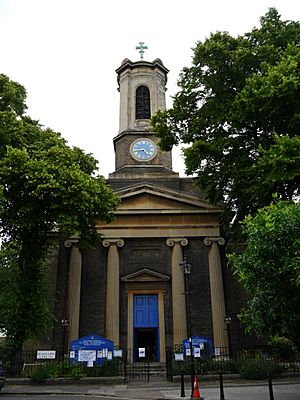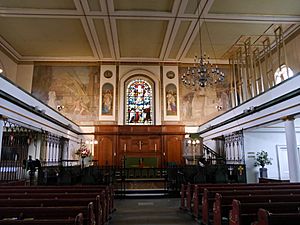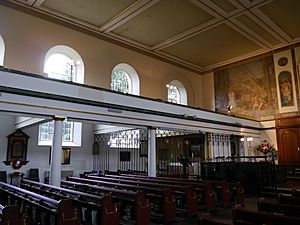St Peter's Church, Hammersmith facts for kids
Quick facts for kids St Peter's Church, Hammersmith |
|
|---|---|
| The Parish Church of Saint Peter | |
 |
|
| Location | Black Lion Lane, Hammersmith, London, W6 9BE |
| Country | England |
| Denomination | Church of England |
| Website | Official website: http://www.stpetersw6.org/index.html |
| History | |
| Dedication | Peter the Apostle |
| Consecrated | 15 October 1829 |
| Administration | |
| Deanery | Hammersmith and Fulham |
| Archdeaconry | Middlesex |
| Diocese | London |
| Province | Canterbury |
St Peter's Church in Hammersmith is a historic Church of England parish church. It is the oldest church in Hammersmith and is recognized as a Grade II* listed building. This special status means it is a particularly important building of more than special interest, and it is protected by law.
Contents
History of the Church
Building St Peter's
When St Peter's was built in the 1820s, the area of Hammersmith looked very different. Instead of busy streets, the church was surrounded by fields, gardens, and small farms. The nearby River Thames helped the area grow, as it was a key route for trade and transport.
The land for the church was a gift from a wealthy local man named George Scott. He was a respected magistrate (a type of judge) who cared about his community. Other important people, like the Bishop of London and the Vicar of Fulham, also gave money to help build the church.
St Peter's is known as a Commissioners' church. This means it was partly paid for by a government group called the Church Building Commission. The commission's goal was to build more churches for England's growing population. The total cost was £12,099, a huge amount of money back then. The first stone was placed on May 16, 1827, and the church officially opened for worship on October 15, 1829.
Architecture and Design
The church was designed by an architect named Edward Lapidge. He was known for designing several other churches and buildings in the London area.
The Look of the Church
Lapidge designed St Peter's in a classical style, inspired by ancient Greek architecture. It features tall columns at the front entrance, which are in a style called the Ionic order. The main building is made of brick, with a stone tower on top.
Inside, the church is one large open space, rather than being divided into a central nave and side aisles. It has galleries, or upper seating areas, on three sides. These galleries are held up by columns in the simpler Doric style. When it first opened, the church could hold 1,691 people.
A magazine from 1831 described the church's tower as having "considerable merit" with a "novel and pleasing" design. However, it also said the inside looked a bit plain.
Special Features
Over the years, many interesting features have been added to the church.
- The Eagle Lectern: A lectern is a stand where the Bible is read from. In 1878, a beautiful wooden lectern carved in the shape of an eagle was given to the church.
- William Morris Decoration: In 1887, the famous artist and designer William Morris, who lived nearby, helped redecorate the inside of the church. At the same time, the old, tall pews were replaced with the seats you see today.
- The Font: The stone font, used for baptisms, was moved from the back of the church to a more central spot where it is still used.
- Murals: The most recent additions are the large paintings, or murals, on the east wall. Painted in 1932, they show two important moments in the life of Saint Peter: Jesus calling him to be an apostle, and Peter preaching in Jerusalem.
- The Bells: The church originally had one bell, made in 1828. In 1916, four more bells were added, creating a "ring" of five bells that can be played together.
Changes Over Time
In 1957, a large new road called the Great West Road was built nearby. To make space for it, the church had to give up some of its land, including a burial ground. The graves were carefully moved to St Paul's Church. Today, only a few old headstones remain on the church grounds.
St Peter's Church has a special partnership with St Bartholomew's Cathedral Church in Messumba, Mozambique.
See also
 | Kyle Baker |
 | Joseph Yoakum |
 | Laura Wheeler Waring |
 | Henry Ossawa Tanner |



